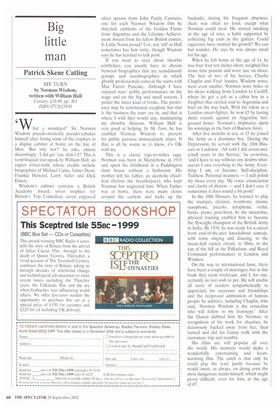Big little man
Patrick Skene Catling
MY TURN by Norman Wisdom, written with William Hall Century, £16.99, pp. 303 ISBN 0712623930 What a swankpot!' Sir Norman Wisdom pseudo-modestly pseudo-rebukes himself after listing some of the trophies in a display cabinet at home on the Isle of Man. 'But why not?' he asks, almost disarmingly. 'I did get 'em, didn't l?' This is ventriloquial star-speak by William Hall, an expert writer-with, whose credits include biographies of Michael Caine, James Dean, Frankie Howerd, Larry Adler and Dick Emery.
Wisdom's cabinet contains a British Academy Award, seven trophies for Britain's Top Comedian, seven engraved silver spoons from John Paddy Carstairs, one for each Norman Wisdom film he directed, emblems of the Golden Flame from Argentina and the Lifetime Achievement Award from his fellow British comics. Is Little Norm proud? Cor, not 'arf! as Hall sometimes has him write, though Wisdom says he has learned to talk posh.
If you want to read about showbiz celebrities, you usually have to choose between biographies that are scandalously gossipy and autobiographies in which ghostly professionals conceal the warts with Max Factor Pancake. Although I have enjoyed stars' public performances on the stage and on the big and small screens, I prefer the latter kind of books. The preference may be sentimental escapism, but that is the business the stars are in, and that is where I wish they would stay, maintaining my showbiz illusions. William Hall is very good at helping. In My Turn, he has enabled Norman Wisdom to present his public persona immaculately intact. If that is all he wants us to know, it's OK with me.
This is a classic rags-to-riches saga. Norman was born in Marylebone in 1915 and spent his childhood in a Paddington slum house without a bathroom. His mother left his father, an alcoholic chauffeur (before the breathalyser), who kept Norman but neglected him. When Father was at home, there were many clouts around the earhole and kicks up the backside; during his frequent absences, there was often no food, except what Norman could steal. He started smoking at the age of nine, a habit supported by collecting fag ends in the gutters. Could cigarettes have stunted his growth? We can but wonder. He says he was always small for his age.
When he left home at the age of 14, he was four foot ten inches short, weighed five stone nine pounds and wore size six shoes. The feet of two of his heroes, Charlie Chaplin and Fred Astaire, Wisdom notes, were even smaller. Norman wore holes in his shoes walking from London to Cardiff, where he got a job as a cabin boy in a freighter that carried coal to Argentina and beef on the way back. With his talent as a London street-fighter, he won 15 by lasting three rounds against an Argentine fairground boxer. Norman's shipmates spent his winnings in the bars of Buenos Aires.
After five months at sea, at 15 he joined the Army as a drummer boy. During the Depression, he served with the 10th Hussars in Lucknow. 'All told I did seven-anda-half years in the Service,' he co-writes, 'and I have to say without any doubts whatsoever I owe everything to the Army. Everything I am, or became. Self-discipline. Tidiness. Personal neatness — I still polish my shoes every day. My voice: enunciation and clarity of diction — and I don't care if sometimes it does sound a bit posh!'
In the 10th Hussars, he learned to play the trumpet, clarinet, trombone, drums, saxophone, piccolo, xylophone, violin, banjo, piano, post-horn. In the meantime, physical training enabled him to become the flyweight champion of the British Army in India. By 1938, he was ready for a career from end-of-the-pier knockabout comedy, with some singing and dancing, to the music-hall variety circuit, to films, to the top of the bill at the Palladium, and Royal Command performances in London and Windsor.
On the way to international fame, there have been a couple of marriages, but in this book they seem irrelevant, and I, for one, certainly do not wish to pry. He will enable all sorts of readers sympathetically to appreciate his successes and friendships and the reciprocal admiration of famous people he admires, including Chaplin, who said, 'Norman Wisdom is the comedian who will follow in my footsteps.' After the Queen dubbed him Sir Norman, in recognition of his work for charities, he decorously backed away from her, then turned and did his Gump walk with the customary trip and stumble.
His films are still popular all over the world. His memoirs would make a wonderfully entertaining and heartwarming film. The catch is that only he could play the lead, partly because he would insist, as always, on doing even the most dangerous stunts himself, which might prove difficult, even for him, at the age of 87.


































































































 Previous page
Previous page